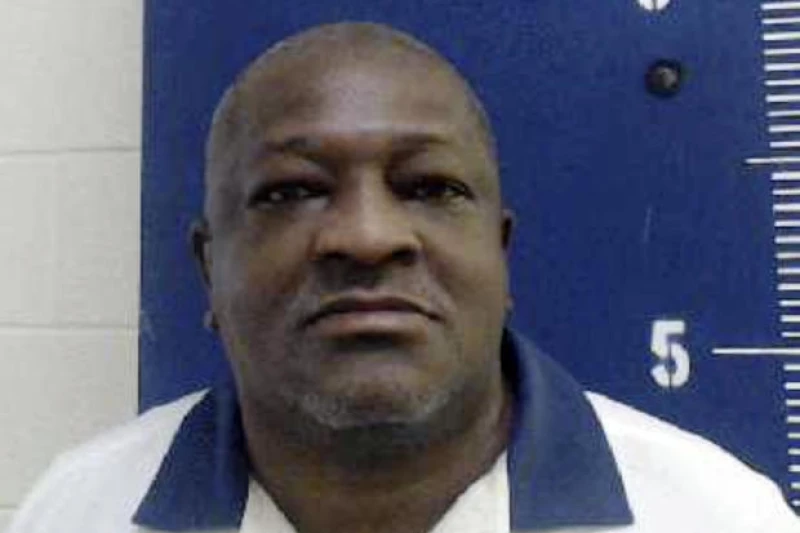A Georgia man convicted of killing his former girlfriend three decades ago has been put to death in the state's first execution in more than four years.
Authorities say 59-year-old Willie James Pye was pronounced dead at 11:03 p.m. Wednesday evening following an injection of the sedative pentobarbital. Pye was convicted of murder and other crimes in the November 1993 abduction, rape and shooting death of Alicia Lynn Yarbrough.
Lawyers for Pye had sought clemency, saying Pye was intellectually disabled and remorseful. The last execution in Georgia was conducted in January 2020 before the COVID-19 pandemic gained force.

Pye's lawyers filed late appeals to the U.S. Supreme Court urging it to intervene, but the justices declined. The attorneys argued the state hadn't met the necessary conditions for resuming executions after the COVID-19 pandemic and reiterated arguments that Pye was intellectually disabled and thus ineligible for execution. State responses to the justices Wednesday night argued that the defense claims were without merit, having been settled previously by the courts.
During the recent plea for clemency with the Georgia Parole Board, Pye's legal team criticized the 1996 trial as a "shocking relic of the past" and highlighted the significant deficiencies in the local public defender system during the 1990s.
Describing the failures of the local justice system as a mechanism that efficiently turned accused individuals into convicted felons akin to Henry Ford's assembly line, Pye's defense attorneys emphasized these points in their clemency petition.
"If defense counsel had fulfilled their responsibilities, the jury would have been informed about Mr. Pye's intellectual disability, evidenced by his IQ of 68," they stated, referencing the evaluation conducted by the state's expert.
Given that intellectually disabled defendants are not eligible for execution, Pye's legal team argued that he met the criteria, but the stringent burden of proof in Georgia made it challenging to establish, they contended.
"Additionally, the jury would have been made aware of the adversities Mr. Pye encountered from a young age — extreme poverty, neglect, and a tumultuous family environment plagued by violence and instability — factors that hindered his ability to experience normal development," the lawyers elaborated. "This type of evidence inherently supports a sentence of life imprisonment."
Despite these arguments, the parole board dismissed the claims following a private session on Tuesday and denied Pye's request for clemency.
Reenactment of the Tragic Murder
Within the intricate web of relationships, Pye and Yarbrough shared a tumultuous romantic history. Despite this, Yarbrough was cohabitating with another man when the fatal incident occurred. Allegedly, Pye, along with Chester Adams and a 15-year-old accomplice, devised a plan to rob the man Yarbrough was living with. They procured a handgun and later attended a party in a neighboring town.
Subsequent to leaving the party at midnight, the trio proceeded to Yarbrough's residence, where they found her alone with her infant. Upon forcefully entering the house, they stole valuables from Yarbrough and coerced her to accompany them, abandoning the baby. The group then transported Yarbrough to a motel, where she was subjected to a heinous assault before being taken in the car to a secluded location.
Upon reaching a desolate dirt road, Pye allegedly instructed Yarbrough to exit the vehicle, lie face down, and callously shot her three times, as detailed in court documents.
Yarbrough's lifeless body was discovered on November 17, 1993, mere hours after the tragic event. Promptly, Pye, Adams, and the teenager were apprehended. While Pye and Adams initially denied involvement in Yarbrough's demise, the teenager confessed and incriminated the duo.
Through a plea agreement with the prosecution, the teenager became a pivotal witness in Pye's trial. In June 1996, a jury convicted Pye of murder, kidnapping, armed robbery, rape, and burglary, subsequently sentencing him to death.
Long history of legal maneuvers
Pye's lawyers had argued in court filings that prosecutors relied heavily on the teenager's testimony but that he later gave inconsistent statements. Such statements, as well as Pye's testimony during trial, indicate that Yarbrough left the home willingly and went to the motel to trade sex for drugs, the lawyers said in court filings.
Lawyers representing Pye also wrote in court filings that their client was raised in extreme poverty in a home without indoor plumbing or access to sufficient food, shoes or clothing. His childhood was characterized by neglect and abuse by family members who were often drunk, his lawyers wrote.
His lawyers also argued that Pye suffered from frontal lobe brain damage, potentially caused by fetal alcohol syndrome, which harmed his planning ability and impulse control.
Pye's lawyers had long argued in courts that he should be resentenced because his trial lawyer didn't adequately prepare for the sentencing phase of his trial. His legal team argued that the original trial attorney failed to do a sufficient investigation into his "life, background, physical and psychiatric health" to present mitigating evidence to the jury during sentencing.
A federal judge rejected those claims, but a three-judge panel of the 11th U.S. Circuit Court of Appeals agreed with Pye's lawyers in April 2021. But then the case was reheard by the full federal appeals court, which overturned the panel ruling in October 2022.
In April 1997, Adams, who is now 55 years old, admitted to his involvement in the crimes alongside Pye. He pleaded guilty to malice murder, kidnapping with bodily injury, armed robbery, rape, and aggravated sodomy. As a result, he was sentenced to five consecutive life terms in prison and is currently serving his sentence.







